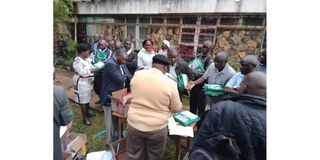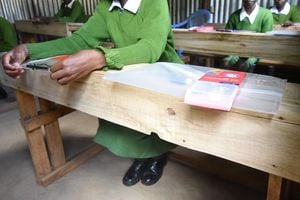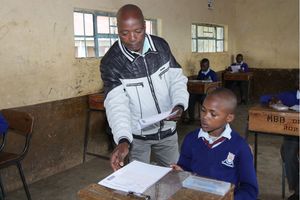
Candidates before the start of the Kenya Primary School Education Assessment exams at Lake Primary School in Kisumu on October 29, 2024.
Learners in Grade 6 completed their Kenya Primary School Education Assessment (KPSEA) on Wednesday, paving the way for the transition to junior secondary school in January 2025.
The assessment which was introduced three years ago marks the end of primary education. Kenya National Examinations Council (Knec) CEO, David Njeng’ere told Nation that the council has already started receiving the answer sheets and expects all of them by Monday next week.
Although the assessment is not used for placement to junior school, the learners will have their assessment reports before they join Grade 7 in January. The reports are descriptive and a departure from traditional examinations where learners receive results after an examination.
Knec will also release school-specific reports and thereafter, a national report on the learners’ progress.

An invigilator frisks Grade Six learners at Michinda Boys Day and Boarding School in Elburgon, Nakuru County as the Kenya Primary School Education Assessment begins nationwide on October 28, 2024.
“They’ve started bringing back the scripts and by Monday we should have all of them back. They will be machine-marked and feedback given to the learners. The learners need feedback that tells them where they are and not that they are better than their classmates. The school reports will be issued so that they can also reflect. The national report will be followed by an annual symposium in August which will bring together various stakeholders. The Kenya Institute of Education will check on the effectiveness of the curriculum they developed as well as the resource materials,” Dr Njeng’ere said.
Formative and summative
KPSEA is organised in two parts: formative and summative. The formative assessment is school-based and is weighted at 60 per cent in every learning area. The learners have already done this and were marked by their respective teachers who then submitted the marks to the Knec. The current assessment will be marked by Knec and will account for 40 per cent of the total marks.
Dr Njeng’ere revealed that 20 per cent of the final KPSEA score will be carried to the end of junior school at Grade 9 when the learners will sit the Kenya Junior School Education Assessment before proceeding to senior school.
The Knec boss said that preparations are complete for the larger candidature examination papers for the Kenya Certificate of Secondary Education (KCSE) that will begin on Monday.
“The preparations are in place and the materials are already in the containers. The examination officials have been guided through the various innovations introduced in the administration of the exams like the double collection of papers which has eliminated early exposure. We added 41 containers for areas where there were issues of distance to schools,” he said.

Alego Usonga DCC Robert Ngetich leading the distribution of Kenya Primary School Education Assessment text papers.
Under the new changes, the containers will be opened at 7.00 am with the examination set to start at 8.00 am. The second collection will be at 12.30 pm while the examination begins at 2.00 pm.
“This has resulted in an unintended outcome – the candidates now have more time in between the papers to relax. The aim of the examination is not to punish them and put them under undue pressure,” Dr Njeng’ere said.
“Mobile phones remain our biggest problem. This time around, all examination officials will surrender their phones which will be kept in a secure lockable desk and the keys kept by the supervisor during the time of the examination,” he added.









